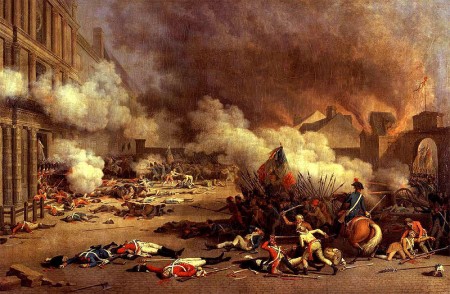
The other day I was re-reading what should perhaps be on every politics student’s bookshelf, Coercion, Capital and European States: AD 990-1992 by Charles Tilly. In this book Tilly examines what formed the modern state by looking at the impact of Europe’s violent history. In contrast to other theories like the idea of a social contract, Tilly argues that: “War wove the European network of national states, and preparation for war created the internal structures of states within it.” The European welfare state as we know it today, Tilly argues, occurred as an inadvertent spin-off from rulers’ bargaining with subject populations when seeking to extract the means to wage war. In exchange for giving up their most valuable resources (sons, lands, weapons, animals), citizens were granted civil rights, social benefits and protection by the state in return.
Throughout the more than 200 pages of historical anecdotes, AD 990-1992 develops a convincing argument that it was indeed rulers’ zeal for developing and adapting to new types of war – thus changing the nature of political-bargaining – that pushed state-transformation. For example, in Revolutionary France the public only agreed to mass disarmament and conscription in exchange for rights of civil suit, local assembly and social benefits.
What is interesting is that Tilly’s theory is rooted in a pessimistic realist understanding of the world as a place where war never ends, only its guises. “1992” in AD990-1992 is hence only an arbitrary year selected by Tilly, probably due to the fact that he wrote in the ‘80s and early ‘90s.
The story Tilly tells us is that as long as there is a need for state coercion, states will exhibit the state-making/war-making logic. “War makes states and states make war.” This is an extraordinary claim. The reasoning that Hobbesian fear of foreign powers makes room for Lockean accommodation at home has become folklore in international relations theory.
In 2012 it will be twenty years since Tilly’s arbitrary “1992,” and much has happened since then. How is Tilly received today? One scholar, Anna Leander, has only recently examined Tilly at length in her article “Wars and the Un-Making of States.” This piece quite neatly captures what seems to be a common concern of scholars writing on Tilly today.
Leander argues that it is primarily the “war makes states” part that no longer holds, for a number of reasons listed here:
- State-Building: Rulers’ competition for controlling coercion is crucial for Tilly’s hypothesis. Today, however, rulers take increasingly minor roles in the organization of coercion. State-building is no longer the product of inter-state warfare but of diplomatic settlements and high-politics at the international level. The competition for power and war between states that was so important for Tilly has changed direction and is something that today takes place internally within states, through civil wars.
- Privatization of Coercion: As a report by the ISN Partner Peace Research Institute Frankfurt shows, since the 1970s Europe and North America have seen growth of 10 per cent per year in private security companies (PSCs), taking over state prerogatives like waging legitimate war and policing the streets. The crucial element in AD 990-1992 – that rulers enjoy a monopoly of legitimate violence – is disappearing. This alters the bargaining between the rulers and the ruled.
- Privatization of Capital: As wars cost money, controlling capital was just as important as control over coercion. In most cases today, however, national economics is a function of international economics and subject to international norms, rules and regulations. Also, new economic realities have emerged like international financial flows and multinational corporations with huge political leverage. All in all, capital is no longer focused on national taxation and the monopoly over the control of capital.
- Different interest groups: The conclusion to draw here is that in AD 990-1992 the civilianization of government occurred through the bargaining between rulers and the ruled, meaning the affected domestic subjects. But in light of the above-mentioned developments the second actor in the bargaining processes has changed. Today, actors who will (hypothetically) finance and wage wars and thus, to follow Tilly’s logic, have the political leverage are groups that do not necessarily reflect the public interest. The privatization of coercion and capital and de-centralization of political power has left rulers as brokers between different (domestic and foreign) interest groups rather than ruling them from a national center. This will affect the type of claims made on the state. Rather than managing a simple world where demands came from one direction – below – pressures today are three dimensional, coming from the left, right and above as well.
The most interesting discussion that comes to mind from these changes is not how they affect just Tilly’s thesis, but how they affect the overall reasoning that war makes the state and the state makes war. Most models that draw on this hypothesis presume certain necessary conditions, like unchallenged state autonomy and capabilities. But these are no longer givens. How this affects political models, and most importantly foundational ones like the security dilemma, is an interesting new area of research. For if we accept these changes, a PSC’s commercially driven interest to expand its capacity should today be just as likely to trigger a security dilemma as the movements of a state. Whether there will be a follow up to AD 990-1992 we do not know, yet one thing is sure: if so, it is likely to feature as many Blackwaters, Buffets and Apples as Napoleons, Brandenburgs, and Habsburgs.

